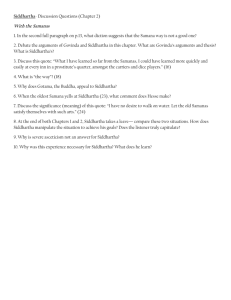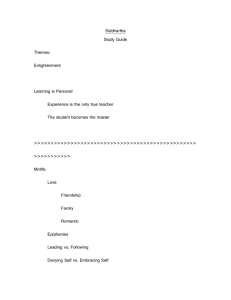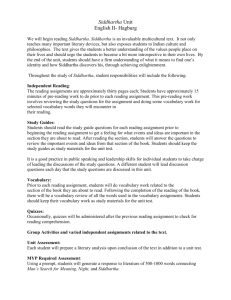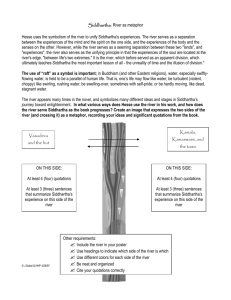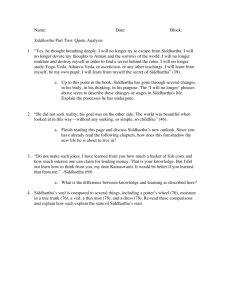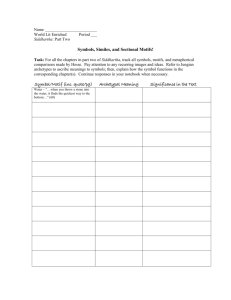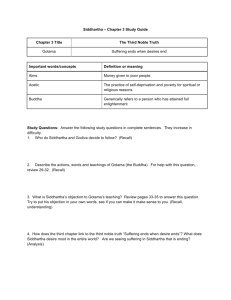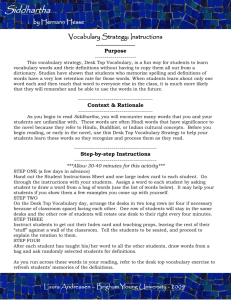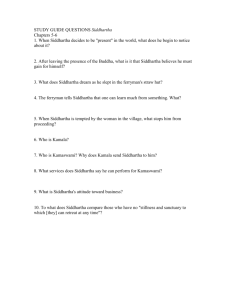English II Name Catalfano Date ____ / ____ / ____ Hermann
advertisement
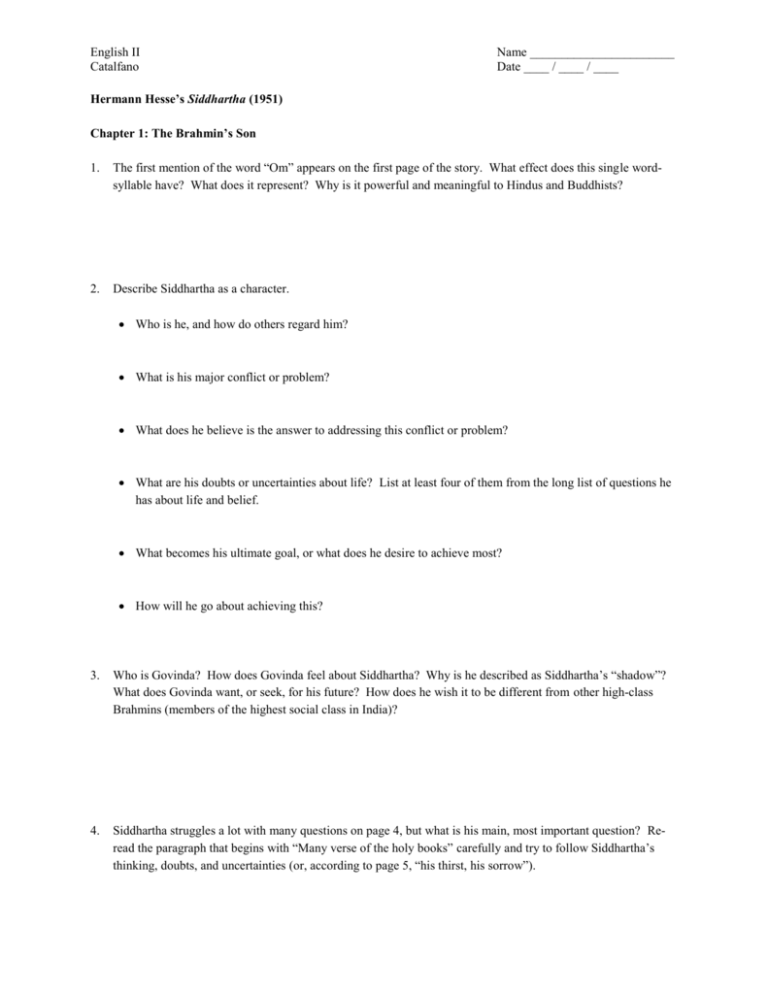
English II Catalfano Name _______________________ Date ____ / ____ / ____ Hermann Hesse’s Siddhartha (1951) Chapter 1: The Brahmin’s Son 1. The first mention of the word “Om” appears on the first page of the story. What effect does this single wordsyllable have? What does it represent? Why is it powerful and meaningful to Hindus and Buddhists? 2. Describe Siddhartha as a character. Who is he, and how do others regard him? What is his major conflict or problem? What does he believe is the answer to addressing this conflict or problem? What are his doubts or uncertainties about life? List at least four of them from the long list of questions he has about life and belief. What becomes his ultimate goal, or what does he desire to achieve most? How will he go about achieving this? 3. Who is Govinda? How does Govinda feel about Siddhartha? Why is he described as Siddhartha’s “shadow”? What does Govinda want, or seek, for his future? How does he wish it to be different from other high-class Brahmins (members of the highest social class in India)? 4. Siddhartha struggles a lot with many questions on page 4, but what is his main, most important question? Reread the paragraph that begins with “Many verse of the holy books” carefully and try to follow Siddhartha’s thinking, doubts, and uncertainties (or, according to page 5, “his thirst, his sorrow”). 5. Why does Siddhartha consider seeking to be “a detour, [an] error” (5)? Does he consider seekers, like his own father, to be happy? Why or why not? 6. Explain the metaphor of bows and arrows at the bottom of pages 5 and continuing onto page 6. 7. Who are the Samanas, or the “Wandering ascetics” that appear on page 6? 8. What can you infer about the family relationship between father and son in traditional Indian culture through this section of the reading (7 – 9)? How do these pages show Siddhartha’s determination to pursue answers to his questions outside the insular life of the palace? Chapter 2: With the Samanas 9. How does Siddhartha change immediately after joining the Samanas (10)? Why does he believe that “all were not worth a passing glance, everything lied, stank of lies; they were all illusions of sense, happiness and beauty. All were doomed to decay. The world tasted bitter. Life was pain” (11)? 10. Throughout the story, Siddhartha alternatively wants to find his Self, and at other times he wants to destroy his Self. According to the story so far, how would you define the Self? How does one find it? When, and if, we do, what should we do with it? Read the paragraph that begins with “Siddhartha had one single goal” on page 11 to better understand this complex, yet simple, idea. Also read the paragraph that begins “Siddhartha learned a great deal from the Samanas” on page 12. Also read the paragraph that begins “And Siddhartha said softly, as if speaking to himself” on page 13. 11. Explain, or analyze, the significance of the final paragraph on page 11 (beginning with “Instructed by…”) and ending on the following page. What is going on in this paragraph? Is Siddhartha literally becoming different animals? Explain. 12. Why does Siddhartha grow impatient or restless while with the Samanas (14 – 15)? What is his solution to this discontent? 13. What does Siddhartha mean when he says “I have spent a long time and have not yet finished, in order to learn this, Govinda: that one can learn nothing” (15). 14. What is the meaning of this verse from one of the Upanishads, or ancient Indian religious texts: “He whose reflective pure spirit sinks into Atman / Knows bliss inexpressible through words” (16)? 15. Who is Gotama, or the Buddha? Why do some people admire him? Why do others doubt him? 16. How does Siddhartha feel about the Gotama (or explain his ambivalent feelings toward him)? 17. What final trick does Siddhartha play on an old Samana at the end of this chapter? Why does he do so? 18. In these pages, we are introduced to a few of the major conflicts of the story. Explain how each of the conflicts on the opposite side of this page plays a role in these first 19 pages of the story. Also, as you continue to read the story, you should note other pages that comment on these ideas. leading vs. following Page _____ , summary: Page _____ , summary: Page _____ , summary: knowledge vs. wisdom Page _____ , summary: Page _____ , summary: Page _____ , summary: teaching vs. experience Page _____ , summary: Page _____ , summary: Page _____ , summary: seeking vs. finding Page _____ , summary: Page _____ , summary: Page _____ , summary: fate vs. free will Page _____ , summary: Page _____ , summary: Page _____ , summary:
